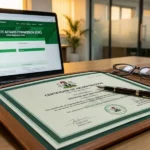Key Steps to Registering a Business in Nigeria
Starting a business in Nigeria presents exciting opportunities, but the legal process can be intricate. At McGuire’s Legal Consult, we specialise in guiding entrepreneurs and organisations through every stage of business registration.
Here’s a guide to help you understand the process and key terms involved.
1. Choose the Right Business Structure
- Sole Proprietorship: This is a business owned and operated by one individual. There is no legal distinction between the owner and the business, meaning the owner is personally responsible for all debts and obligations.
- Partnership: Involves two or more people sharing ownership, profits, losses, and liabilities as outlined in a partnership agreement.
- Limited Liability Company (LLC): A separate legal entity from its owners (shareholders), protecting them from personal liability for business debts and obligations.
Considerations: Assess the level of liability you are willing to accept, tax implications, and your long-term business goals before making a choice.
2. Conduct Name Search and Reservation
- Name Search: This involves checking the availability of your desired business name to ensure it is unique and not already registered.
- Reservation: Temporarily securing your chosen name with the Corporate Affairs Commission (CAC) to prevent others from registering it while you complete your application.
Both steps can be completed online via the CAC portal for convenience.
3. Prepare Incorporation Documents
- Memorandum and Articles of Association: Legal documents stating the company’s objectives, structure, and internal regulations.
- CAC Forms: Standardised forms required by the CAC for company registration.
- Identification of Directors/Shareholders: Official documents such as a national ID card or international passport confirming the identity of those involved.
- Evidence of Address: Proof of the business’s physical address, such as a recent utility bill.
For an LLC, at least two directors are required under Nigerian law.
4. File with the CAC
- Filing: Submission of all required documents and payment of statutory fees through the CAC portal or at their office.
- Certificate of Incorporation: The official document issued by the CAC, confirming your business’s legal existence.
5. Obtain Relevant Permits and Licences
- Permits/Licences: Authorisations required for certain business activities, including:
- NAFDAC: National Agency for Food and Drug Administration and Control (for food, drugs, and cosmetics).
- SON: Standards Organisation of Nigeria (for product standards).
- Local Government Permits: Required for operating within specific localities.
- Tax Identification Number (TIN): Issued by the Federal Inland Revenue Service (FIRS) for tax purposes.
6. Post-Registration Compliance
- Corporate Bank Account: A dedicated account for business transactions.
- Annual Returns: Yearly filings with the CAC to confirm the company’s continued existence and compliance.
- Regulatory Filings: Submissions required by various government agencies to maintain compliance.
Need help registering your business or navigating compliance?
Contact McGuire’s Legal Consult today for expert assistance with business registration, advisory, and ongoing legal support.

